The caffeine content in a Monster Energy drink is a key concern for consumers looking for that extra boost, and at HOW.EDU.VN, we understand the importance of knowing exactly what you’re putting into your body. Monster Energy drinks pack a significant amount of caffeine, typically around 160mg per 16-ounce can, but this can vary depending on the specific product. This article provides a comprehensive overview of caffeine levels in various Monster Energy drinks, compares them to other beverages like coffee, and explores the potential health implications, ensuring you can make informed choices about your energy boost. To learn more about caffeinated beverages, energy drink ingredients, and caffeine safety, keep reading.
1. Caffeine Content in Monster Energy Drinks
Monster Energy drinks come in many varieties, each with a unique caffeine level. Knowing the caffeine content in your chosen Monster beverage is essential for managing your daily intake.
Here’s a quick look at the caffeine levels in some popular Monster Energy drinks:
| Monster Energy Drink | Caffeine Content (per 16 oz can) |
|---|---|
| Original Monster Energy | 160 mg |
| Monster Energy Ultra | 140-160 mg |
| Monster Rehab | 150-160 mg |
| Monster MAXX | 170-180 mg |
| Monster Java | 188 mg |
| Monster Assault | 160 mg |
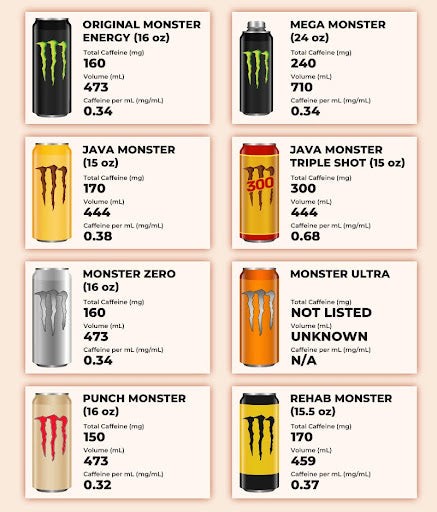
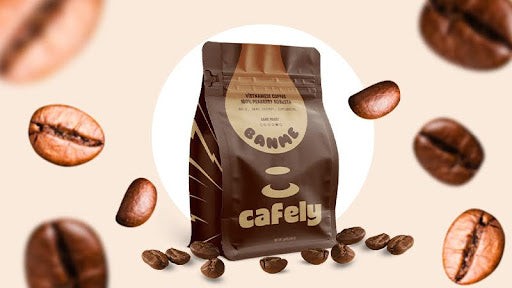
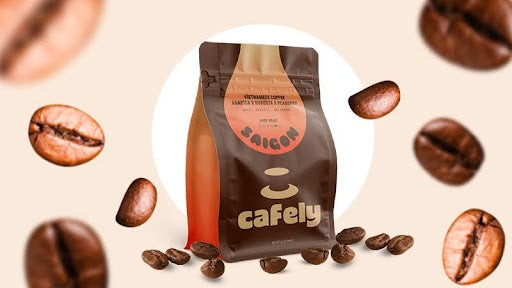
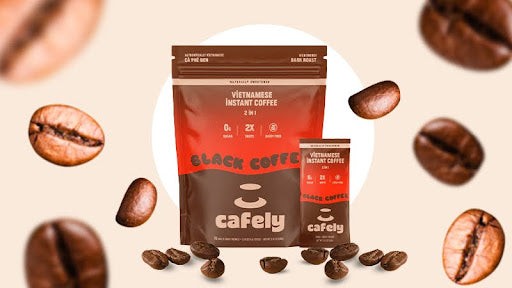
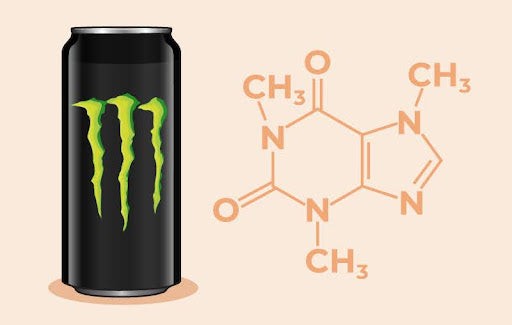
Other Active Ingredients in Monster Energy
Besides caffeine, Monster Energy drinks contain several other active ingredients that can affect your body. Understanding these ingredients is important for assessing the overall impact of these drinks on your health.
Here are some key active ingredients found in Monster Energy drinks:
- Taurine: An amino acid that helps maintain electrolyte balance and boosts endurance.
- Inositol: Supports metabolism, insulin function, and energy conversion from nutrients.
- L-Carnitine: Aids in converting fat into energy.
- B Vitamins: Support cell function and metabolism.
While these ingredients may sound beneficial, dieticians caution that their concentrations in energy drinks are higher than what you’d naturally get from food, potentially amplifying the effects of caffeine. Combining these ingredients with caffeine can impact arterial function by inhibiting proper dilation [1].
It’s important to note that Monster Energy drinks are generally not recommended for pregnant or nursing women, children, or individuals sensitive to caffeine. If you have health concerns, consulting with a healthcare professional is always a good idea. At HOW.EDU.VN, our expert consultants can provide personalized advice based on your specific health needs.
2. Caffeine Comparison: Monster vs. Coffee
Coffee is a staple for many seeking a caffeine boost, but how does it compare to Monster Energy drinks? Understanding the caffeine content of each can help you make an informed choice.
An average 8-ounce cup of coffee contains about 100 milligrams of caffeine, though this amount can vary based on the coffee type, brewing method, and coffee-to-water ratio. Espresso shots typically contain 75 mg of caffeine, while a 4-ounce cup of Vietnamese coffee can pack up to 130 mg.
Factors affecting caffeine content in coffee include:
- High coffee-to-water ratio
- Use of dark roast Robusta beans
- Brewing method
Even a strong cup of Vietnamese coffee often contains less caffeine than a standard can of Monster Energy.
Here’s a comparison of caffeine content in Monster Energy drinks versus various coffee types:
| Type of Coffee | Size of Cup | Caffeine per Serving |
|---|---|---|
| Vietnamese Coffee | 2-4 oz | 66-130 mg |
| Espresso Coffee (single shot) | 1-2 shots | 75-150 mg |
| Pour-over | 8 oz | 90-160 mg |
| Cold Brew | 16 oz | 197-213 mg |
| French Press | 8 oz | 100-137 mg |
| Drip Coffee | 8 oz | 65-120 mg |
| Instant Coffee | 8 oz | 80-120 mg |
Coffees That Are Stronger Than Monster Energy Drinks
If you’re looking for a stronger caffeine kick without the additives found in energy drinks, there are coffee alternatives that can provide a more potent boost.
Here are reasons to consider coffee over energy drinks:
- Natural, plant-derived source
- Contains vitamins, antioxidants, and other nutrients [2]
- Free from added sugars, glucose, sucralose, and synthetic compounds (unless added)
1. Cafely BanMe Coffee
Cafely’s BanMe is optimized for strength, containing 9000 mg of caffeine per bag. It is made exclusively from 100% shade-grown peaberry robusta beans, a rare variety known for producing the world’s strongest coffee.
2. Cafely SaiGon OG Coffee
SaiGon OG is another excellent choice, delivering a full-bodied coffee experience with approximately 120-150 milligrams of caffeine per cup. This blend combines robusta, arabica, and peaberry beans.
Robusta is stronger than arabica in both flavor and caffeine content, and peaberry beans contain nearly 30% more caffeine than typical robusta. SaiGon OG is also versatile, suitable for both traditional and modern brewing methods, including phin, French press, pour-over, and standard coffee brewers.
3. Cafely Instant Coffee Packs
Cafely also offers highly caffeinated instant coffee packs, providing 150 mg of caffeine in a quick, ready-to-go format. These packs have about the same caffeine as two espresso shots and are close to the 160 mg found in the original Monster Energy drink. Cafely’s new instant packs offer even more, with 300 mg of caffeine per packet, doubling the amount in a Monster drink.
3. Monster Energy vs. Other Energy Drinks
When compared to other popular energy drinks, Monster sits in the middle regarding caffeine content. Understanding these differences can help you choose an energy drink that meets your needs without exceeding your caffeine limits.
Bang contains the highest amount of caffeine, with 300 mg per can, while Red Bull has a lower caffeine content at 80 mg.
Here’s a comparison of caffeine levels in popular caffeinated drinks:
| Drink | Serving Size | Caffeine per Serving | Caffeine Per oz |
|---|---|---|---|
| Bang | 16 fl oz | 300 mg | 18.75 mg/oz |
| Monster | 16 fl oz | 160 mg | 10 mg/oz |
| Red Bull | 8.5 fl oz | 80 mg | 9.6 mg/oz |
| Rockstar | 16 fl oz | 160 mg | 10 mg/oz |
| Regular Coffee | 8 oz | 80–100 mg | 10 mg/oz |
| Decaf Coffee | 8 oz | 0–7 mg | ~1 mg/oz |
| Black Tea | 8 oz | 60 mg | 5 mg/oz |
| Matcha | 8 oz | 100 mg | 12.5 mg/oz |
4. About the Monster Energy Corporation
Monster Energy is a subsidiary of Monster Beverage Corporation, based in California. The company develops and markets a range of energy drinks, including Monster Energy, Monster Energy Ultra, and Monster MAXX.
Founded as Hansen’s in 1935, the company initially sold juice products and rebranded as Monster Beverage in 2012. The company’s annual reports are available on their website dating back to 2004. In the first quarter of 2024, Monster Beverage Corporation reported an 11.8% increase in net sales, reaching $1.90 billion, up from $1.70 billion in the same period of 2023. Net sales for the Monster Energy Drinks segment increased by 10.7% to $1.73 billion, compared to $1.56 billion in 2023.
In 2023, the Monster Energy brand held a market share of 29.7 percent based on U.S. dollar sales, second only to Red Bull.
5. Health Implications of Caffeine
Knowing the health implications of caffeine is essential for making informed decisions about your consumption. Understanding how much is too much and the potential side effects can help you maintain a balanced and healthy lifestyle.
Healthy adults can generally consume up to 400 mg of caffeine per day, which is about four or five cups of coffee. However, it’s important to watch for negative side effects such as jitters, insomnia, anxiety, changes in heart rate, headaches, or stomach upset. These symptoms indicate that you may need to reduce your caffeine intake. Some individuals may need to eliminate caffeine completely to avoid these effects.
Caffeine can be part of a healthy diet for most people, but excessive intake can pose health risks. The definition of “too much caffeine” varies from person to person, depending on factors like:
- Body weight
- Medications
- Individual sensitivity
- Metabolism rate
Pregnant women, those trying to conceive, and breastfeeding mothers should consult their doctor about safe caffeine limits.
Is Caffeine Safe for Children?
The FDA has not established specific caffeine consumption guidelines for children, but the American Academy of Pediatrics advises against caffeine and other stimulants for children and adolescents. The National Federation of State High School Associations also recommends that young people avoid energy drinks.
Parents should be aware that energy drinks can contain high and varied amounts of caffeine, and some studies suggest that caffeine intake should be discouraged for all children [3].
Excessive caffeine consumption can lead to potential risks. For example, toxic effects like seizures can occur with rapid consumption of around 1,200 mg of caffeine or 0.15 tablespoons of pure caffeine. It’s important to note that these amounts refer to pure and highly concentrated caffeine products, often labeled as dietary supplements, which can have serious health consequences, including death.
6. FAQs: Caffeine in Monster Energy
Navigating the world of energy drinks and caffeine content can be confusing. Here are some frequently asked questions to help you better understand the caffeine levels and potential effects of Monster Energy drinks.
1. How much caffeine is in a standard can of Monster Energy?
A standard 16-ounce can of the original Monster Energy drink contains 160 milligrams of caffeine. Other Monster drinks typically range from 150-170 mg per can, though some varieties may have higher amounts.
2. Is it safe to drink Monster Energy every day?
It’s generally recommended to consume energy drinks in moderation rather than making them a regular habit. The FDA suggests that adults consume no more than 400 mg of caffeine per day, which is about four or five cups of coffee. Consuming two Monster Energy drinks would approach this limit, and some product lines contain up to 300 mg of caffeine per can. Additionally, the other active ingredients in Monster Energy drinks should also be taken into consideration.
3. How does the caffeine in Monster compare to a cup of coffee?
The original Monster Energy drink contains 160 milligrams of caffeine in a 16-ounce can. Some Monster products can contain up to 300 milligrams of caffeine per can. In comparison, a typical cup of coffee contains about 100 milligrams of caffeine, although this can vary depending on several factors.
4. Can you experience caffeine withdrawal from Monster?
Yes, caffeine withdrawal can occur when you abruptly stop consuming caffeine regularly. Symptoms of caffeine withdrawal from Monster Energy drinks can range from physical symptoms like headaches and fatigue to mental and emotional symptoms such as irritability and low mood.
5. What are healthier caffeine alternatives to Monster?
Coffee is generally considered a healthier alternative to energy drinks because it is a natural, plant-derived beverage. If you prefer not to drink coffee, black or green tea are good options. Tea has less caffeine than coffee but still offers a decent amount and is beneficial for your health.
6. Does Monster Energy contain natural or synthetic caffeine?
Monster Energy likely contains synthetic caffeine since it is not derived from the same natural sources as coffee. Coffee is a natural, plant-derived food, while energy drinks often contain a lot of sugar or sucralose, artificial flavors, and other additives.
7. What are the effects of Monster Energy on long-term health?
Long-term consumption of Monster Energy drinks could be harmful due to the high caffeine content per can, as well as the presence of added sugars, glucose, sucralose, artificial flavors, and other additives. Additionally, there is limited research on the long-term effects of many of the other ingredients found in energy drinks, particularly when combined with caffeine.
8. How long does the caffeine effect from a Monster last?
The caffeine boost from a Monster Energy drink typically lasts about the same or slightly longer than other caffeinated beverages. The additional active ingredients may help prolong the effects, but generally, caffeine stays in your system for 6-9 hours.
9. Are there any Monster Energy drinks without caffeine?
Currently, there do not appear to be any zero-caffeine options in the Monster Energy product line. Even the Zero Sugar Ultra version still contains a “full load of our Monster energy blend,” despite having no sugar and only ten calories.
10. What is the maximum amount of Monster one should drink in a day?
An original Monster Energy drink contains 160 milligrams of caffeine, and the FDA’s recommended daily intake is 400 mg. This means you could theoretically drink a little over two cans a day, but it’s important to consider the other ingredients as well. The warning on a Monster Energy Zero Ultra can states: “Max one can every 4 hours with a limit of 3 cans per day, not recommended for children, people sensitive to caffeine, pregnant women or women who are nursing.”
Understanding the caffeine content in Monster Energy drinks and its potential effects is crucial for making informed choices. At HOW.EDU.VN, we provide expert insights to help you navigate these decisions.
Are you facing challenges in understanding the effects of energy drinks on your health? Do you need personalized advice from experienced professionals? At HOW.EDU.VN, we connect you with leading experts, including over 100 renowned PhDs, who can offer tailored guidance.
References
- Higgins, J. P., Yang, B., Herrin, N. E., Yarlagadda, S., Le, G. T., Ortiz, B. L., … & Infanger, S. C. (2017). Consumption of energy beverages is associated with attenuation of arterial endothelial flow-mediated dilatation. World journal of cardiology, 9(2), 162.
- Liang, N., & Kitts, D. D. (2014). Antioxidant property of coffee components: assessment of methods that define mechanisms of action. Molecules, 19(11), 19180-19208.
- Liang, Ningjian and Kitts, David D. (2014). Antioxidant Property of Coffee Components: Assessment of Methods that Define Mechanisms of Action. Vancouver, Canada. University of British Columbia Molecules.10.3390/molecules191119180
Ready to take control of your health and wellness with expert advice?
Contact us today for a consultation:
- Address: 456 Expertise Plaza, Consult City, CA 90210, United States
- WhatsApp: +1 (310) 555-1212
- Website: HOW.EDU.VN
Let how.edu.vn be your trusted partner in achieving a healthier, more informed lifestyle.